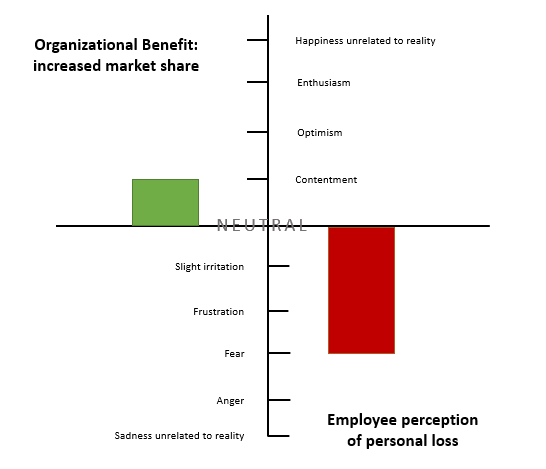The Impact of Loss Aversion on Organizational Change Efforts
When it comes to organizational change, I have never met or read about or heard about anyone who does not like change. In my experience, everyone loves change!
There are many great books and articles written on Change Management. All of them at some point will make a reference to the research on change management that says 70% of changes implemented by organizations across the world do not accomplish the intended outcome and would thus be considered failures. A common explanation for these failures is the overly simplistic – “Nobody likes change, that is why it is so difficult”.
Based on my experience, I strongly disagree with that statement. I would go so far as to say, I have never met or read about or heard about anyone who does not like change. In my experience, everyone loves change! (I will give you a moment to catch your breath) What I have heard and observed first hand is, everyone hates losing because of change. It is not the change they resist; they resist whatever loss they perceive to be caused by the change.
It seems appropriate at this point to talk about the concept of Loss Aversion.
Loss Aversion = From an emotional or psychological perspective, the expect degree of pain of a loss is about twice as powerful as the expected pleasure from a gain.
Applied to the staff in an organization, the pull from an expected gain of an organizational change is much less powerful as the force of the repulsion of an expected personal loss because of an organizational change. The expected pain from a perceive loss exerts a greater force than the expected gain of equal value. The tendency for staff to resist what they perceived as a loss is understandable. Resistance takes many forms, most are subtle, although I have experienced some very blatant hostilities that caught me off-guard. I was presenting to a group of about 200 individuals about the upcoming a major IT implementation. From the front of the room one of the participants began to yell at me at the top of her voice, poking the air and shaking as she spoke. When she finally stopped talking, I added fuel to her fire because my next words were about organizational need and the business environment.
Leaders tend to focus on organizational benefits & gains (as I did back then). Employees focus their energy on avoiding personal losses. Losses such as:
- Actual or perceived downgrade in organizational position/role
- Actual or perceived loss of intellectual competence/comfort
- Actual or perceived loss of organizational predictability
- Actual or perceived loss of organizational status/reputation
- Actual or perceived loss of skill set competence
Often, when leaders are faced with employees’ resistance to change, they double down on highlighting the organizational gain and/or the external factors that dictated the change. Rarely do leaders consider or directly talk about the perception of loss for the individuals who make up the organization. Some leaders consider it an illegitimate conversation to focus on employees’ losses. And yet, it is the actions and behaviors of employees who will make the change successful.
EMPLOYEES REACTION TO LOSS CAUSED BY ORGANIZATIONAL CHANGE
An organization announces a change in workflow in order to increase efficiency to gain more market share.

You may have seen the recent videos of the amazing robots currently being built by Boston Dynamics. The robots can be programed to do tasks that make them seem human. A robot can be programmed and reprogrammed at the will of the developers. The robots simply and immediately make the change and do the new task. Robots do not have any sense of loss; they have no emotions. On the other hand, employees are not robots, but it is not uncommon for employees to say they feel like they are being treated like machines.
As a part of the change management strategy:
- Incorporate a discussion about employees’ perception of what they are thinking they will lose when the change is implemented
- Acknowledge their feelings of loss. Acknowledgement of feelings is not a weakness. It is a recognition of their humanness.
Does this resonate with your experience?
